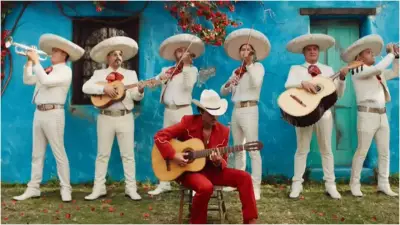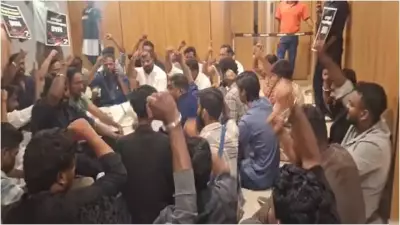
The 56th International Film Festival of India (IFFI) inaugurated in spectacular fashion on Thursday evening, transforming Panaji's streets into a vibrant carnival of cinema and culture. Breaking from tradition, the opening ceremony moved from indoor venues to the bustling promenades of Goa's capital, bringing the festival closer to the people.
From Stadium to Streets: A Paradigm Shift
For the first time in years, IFFI abandoned the conventional indoor stadium setting at Dr Shyama Prasad Mukherjee Indoor Stadium in Taleigao. Instead, a grand parade electrified the stretch from the Entertainment Society of Goa (ESG) office to Kala Academy, creating an unprecedented public spectacle.
The transformation represents a strategic move by festival organizers to make IFFI more accessible to Goan residents while maintaining its international appeal. As Governor Pusapati Ashok Gajapathi Raju noted, this carnival-like approach brings IFFI closer to Goa's common people, creating a more inclusive celebration of cinema.
A Spectacle of Culture and Cinema
The evening unfolded as a magnificent blend of traditional Indian culture and cinematic excellence. Folk troupes from across the nation performed with infectious energy, followed by elaborate tableaux celebrating recent film successes and iconic movie moments.
As revelers filled the makeshift seating arrangements along the Panaji Promenade by the Mandovi river, the atmosphere transformed into what many described as a perfect fusion of India's rich cultural heritage and its booming film industry. The vibrant procession included performances that showcased diverse regional traditions alongside tributes to cinematic achievements.
Embracing the Orange Economy Vision
Prior to the artistic parade, dignitaries emphasized the government's focus on developing the orange economy - an economic model that integrates culture, creativity, technology, and intellectual property. This year's festival embodies this vision through its theme: convergence of creativity and technology.
I&B Ministry Secretary Sanjay Jaju revealed impressive statistics about this year's edition: IFFI 2025 received approximately 3,000 applications, making it the largest collection of movies in the festival's history. This overwhelming response underscores India's growing influence in global cinema.
Minister of State L Murugan highlighted the significance of the WAVES Film Bazaar, which provides Indian filmmakers with platforms to achieve global reach and recognition. The festival's expanded scale reflects India's ambition to become a cinematic powerhouse.
Goa's Cinematic Ambitions Take Center Stage
Chief Minister Pramod Sawant articulated Goa's vision to become a global film production hub, citing the state's international infrastructure and hospitality as key factors in IFFI's successful 22-year run in Goa. The festival has found a permanent home in Goa since 2004, thanks to efforts by the late Manohar Parrikar.
Sawant detailed comprehensive policy measures designed to attract filmmakers year-round, including film finance schemes and revised shooting rules that facilitate faster permissions. A single window clearance system is currently in development to streamline the process further.
Two Goan films, Pilot and Claudia, have been selected for the gala premier section, marking a significant achievement for the state's local film industry. This recognition coincides with India's emergence as a global soft power under Prime Minister Narendra Modi's leadership.
The festival opened with Brazilian auteur Gabriel Mascaro's The Blue Trail and will continue through November 28, featuring diverse cinematic experiences including the 48-hour film challenge that saw participation from Union Minister of State L Murugan.
In a special ceremony, Telugu star Nandamuri Balakrishna was honored for completing fifty remarkable years in cinema, adding to the evening's celebratory atmosphere. The 56th IFFI continues until November 28, promising an exciting week of cinematic discoveries and cultural exchanges.






